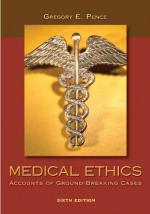|
This section contains 380 words (approx. 2 pages at 300 words per page) |

|
Antibiotic: A substance derived from a microorganism used to treat disease.
Autonomy: Freedom to act independently and make one's own decisions.
Beneficence: Doing good, or performing helpful acts.
Bioethicist: One who analyzes and interprets medical ethics.
Cadaver organ: A body part, such as a kidney or liver, taken from the body of a person who recently died, for purposes of transplantation into another living person.
Chromosome: A unit of DNA, the inheritable matter found inside cells that relates to one's characteristics and functions. A normal human being has forty-six chromosomes, which are further divided into segments known as genes.
Common law: Legal rules based on court decisions and tradition (as opposed to enactments of legislatures).
Enzyme: A protein produced by cells that causes a chemical reaction in a body.
Ethicist: A person who analyzes and interprets ethical issues. Ethics are the principles and values that apply when people...
|
This section contains 380 words (approx. 2 pages at 300 words per page) |

|




